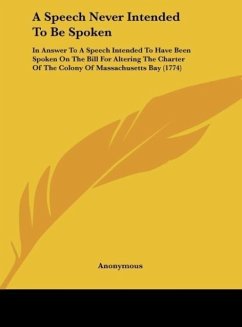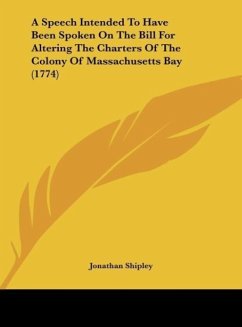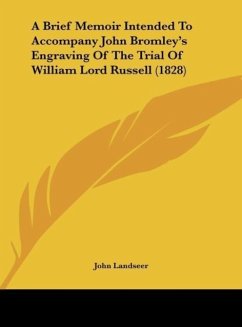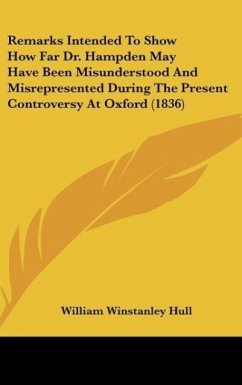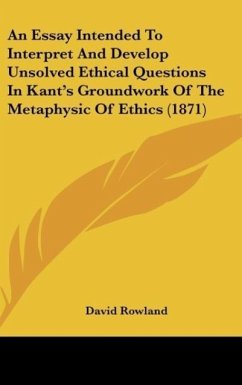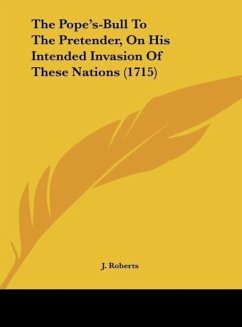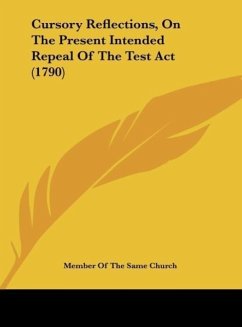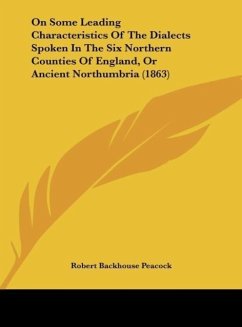Anonymous
A Speech Never Intended To Be Spoken
In Answer To A Speech Intended To Have Been Spoken On The Bill For Altering The Charter Of The Colony Of Massachusetts Bay (1774)
29,99 €
inkl. MwSt.
Versandfertig in 1-2 Wochen

15 °P sammeln
Anonymous
A Speech Never Intended To Be Spoken
In Answer To A Speech Intended To Have Been Spoken On The Bill For Altering The Charter Of The Colony Of Massachusetts Bay (1774)
- Gebundenes Buch
- Merkliste
- Auf die Merkliste
- Bewerten Bewerten
- Teilen
- Produkt teilen
- Produkterinnerung
- Produkterinnerung
This book is a facsimile reprint and may contain imperfections such as marks, notations, marginalia and flawed pages.
Andere Kunden interessierten sich auch für
![A Speech Intended To Have Been Spoken On The Bill For Altering The Charters Of The Colony Of Massachusetts Bay (1774) A Speech Intended To Have Been Spoken On The Bill For Altering The Charters Of The Colony Of Massachusetts Bay (1774)]() Jonathan ShipleyA Speech Intended To Have Been Spoken On The Bill For Altering The Charters Of The Colony Of Massachusetts Bay (1774)29,99 €
Jonathan ShipleyA Speech Intended To Have Been Spoken On The Bill For Altering The Charters Of The Colony Of Massachusetts Bay (1774)29,99 €![A Brief Memoir Intended To Accompany John Bromley's Engraving Of The Trial Of William Lord Russell (1828) A Brief Memoir Intended To Accompany John Bromley's Engraving Of The Trial Of William Lord Russell (1828)]() John LandseerA Brief Memoir Intended To Accompany John Bromley's Engraving Of The Trial Of William Lord Russell (1828)29,99 €
John LandseerA Brief Memoir Intended To Accompany John Bromley's Engraving Of The Trial Of William Lord Russell (1828)29,99 €![Remarks Intended To Show How Far Dr. Hampden May Have Been Misunderstood And Misrepresented During The Present Controversy At Oxford (1836) Remarks Intended To Show How Far Dr. Hampden May Have Been Misunderstood And Misrepresented During The Present Controversy At Oxford (1836)]() William Winstanley HullRemarks Intended To Show How Far Dr. Hampden May Have Been Misunderstood And Misrepresented During The Present Controversy At Oxford (1836)29,99 €
William Winstanley HullRemarks Intended To Show How Far Dr. Hampden May Have Been Misunderstood And Misrepresented During The Present Controversy At Oxford (1836)29,99 €![An Essay Intended To Interpret And Develop Unsolved Ethical Questions In Kant's Groundwork Of The Metaphysic Of Ethics (1871) An Essay Intended To Interpret And Develop Unsolved Ethical Questions In Kant's Groundwork Of The Metaphysic Of Ethics (1871)]() David RowlandAn Essay Intended To Interpret And Develop Unsolved Ethical Questions In Kant's Groundwork Of The Metaphysic Of Ethics (1871)29,99 €
David RowlandAn Essay Intended To Interpret And Develop Unsolved Ethical Questions In Kant's Groundwork Of The Metaphysic Of Ethics (1871)29,99 €![The Pope's-Bull To The Pretender, On His Intended Invasion Of These Nations (1715) The Pope's-Bull To The Pretender, On His Intended Invasion Of These Nations (1715)]() J. RobertsThe Pope's-Bull To The Pretender, On His Intended Invasion Of These Nations (1715)29,99 €
J. RobertsThe Pope's-Bull To The Pretender, On His Intended Invasion Of These Nations (1715)29,99 €![Cursory Reflections, On The Present Intended Repeal Of The Test Act (1790) Cursory Reflections, On The Present Intended Repeal Of The Test Act (1790)]() Member Of The Same ChurchCursory Reflections, On The Present Intended Repeal Of The Test Act (1790)29,99 €
Member Of The Same ChurchCursory Reflections, On The Present Intended Repeal Of The Test Act (1790)29,99 €![On Some Leading Characteristics Of The Dialects Spoken In The Six Northern Counties Of England, Or Ancient Northumbria (1863) On Some Leading Characteristics Of The Dialects Spoken In The Six Northern Counties Of England, Or Ancient Northumbria (1863)]() Robert Backhouse PeacockOn Some Leading Characteristics Of The Dialects Spoken In The Six Northern Counties Of England, Or Ancient Northumbria (1863)29,99 €
Robert Backhouse PeacockOn Some Leading Characteristics Of The Dialects Spoken In The Six Northern Counties Of England, Or Ancient Northumbria (1863)29,99 €-
-
-
This book is a facsimile reprint and may contain imperfections such as marks, notations, marginalia and flawed pages.
Hinweis: Dieser Artikel kann nur an eine deutsche Lieferadresse ausgeliefert werden.
Hinweis: Dieser Artikel kann nur an eine deutsche Lieferadresse ausgeliefert werden.
Produktdetails
- Produktdetails
- Verlag: Kessinger Publishing, LLC
- Seitenzahl: 40
- Erscheinungstermin: 23. Mai 2010
- Englisch
- Abmessung: 286mm x 221mm x 7mm
- Gewicht: 388g
- ISBN-13: 9781161846614
- ISBN-10: 1161846611
- Artikelnr.: 31025531
- Herstellerkennzeichnung
- Libri GmbH
- Europaallee 1
- 36244 Bad Hersfeld
- gpsr@libri.de
- Verlag: Kessinger Publishing, LLC
- Seitenzahl: 40
- Erscheinungstermin: 23. Mai 2010
- Englisch
- Abmessung: 286mm x 221mm x 7mm
- Gewicht: 388g
- ISBN-13: 9781161846614
- ISBN-10: 1161846611
- Artikelnr.: 31025531
- Herstellerkennzeichnung
- Libri GmbH
- Europaallee 1
- 36244 Bad Hersfeld
- gpsr@libri.de
Vyasa (c. 200 BC) is the legendary author of the Mahabharata, Vedas and Puranas, some of the most important works in the Hindu tradition. Vyasa appears for the first time as the compiler of, and an important character in, the Mahabharata. It is said that he was the expansion of the God Vishnu, who came in Dwaparayuga to make all the Vedic knowledge from oral tradition available in written form. He was the son of Satyavati, adopted daughter of the fisherman Dusharaj and the wandering sage Parashara, who is credited with being the author of the first Purana, Vishnu Purana. He was born on an island in the river Yamuna. Due to his dark complexion, Vyasa was also given the name Krishna, in addition to the name Dwaipayana, meaning "island-born." According to the Mahabharata, the sage Vyasa was the son of Satyavati and Parashara. During her youth, Satyavati was a fisherwoman who used to drive a boat. One day, sage Parashara was in a hurry to attend a Yajna. Satyavati helped him cross the river borders. On this account, the sage offered her a mantra which would result in begetting a son who would be a sage with wisdom and all good qualities. Satyavati immediately recited the mantra and thus Vyasa was born. She kept this incident a secret, not telling even King Shantanu. The festival of Guru Purnima is dedicated to Vyasa. It is also known as Vyasa Purnima, for it is the day believed to be both his birthday and the day he divided the Vedas. Vyasa is also considered to be one of the seven Chiranjivins (long-lived, or immortals), who are still in existence according to Hindu tradition.
